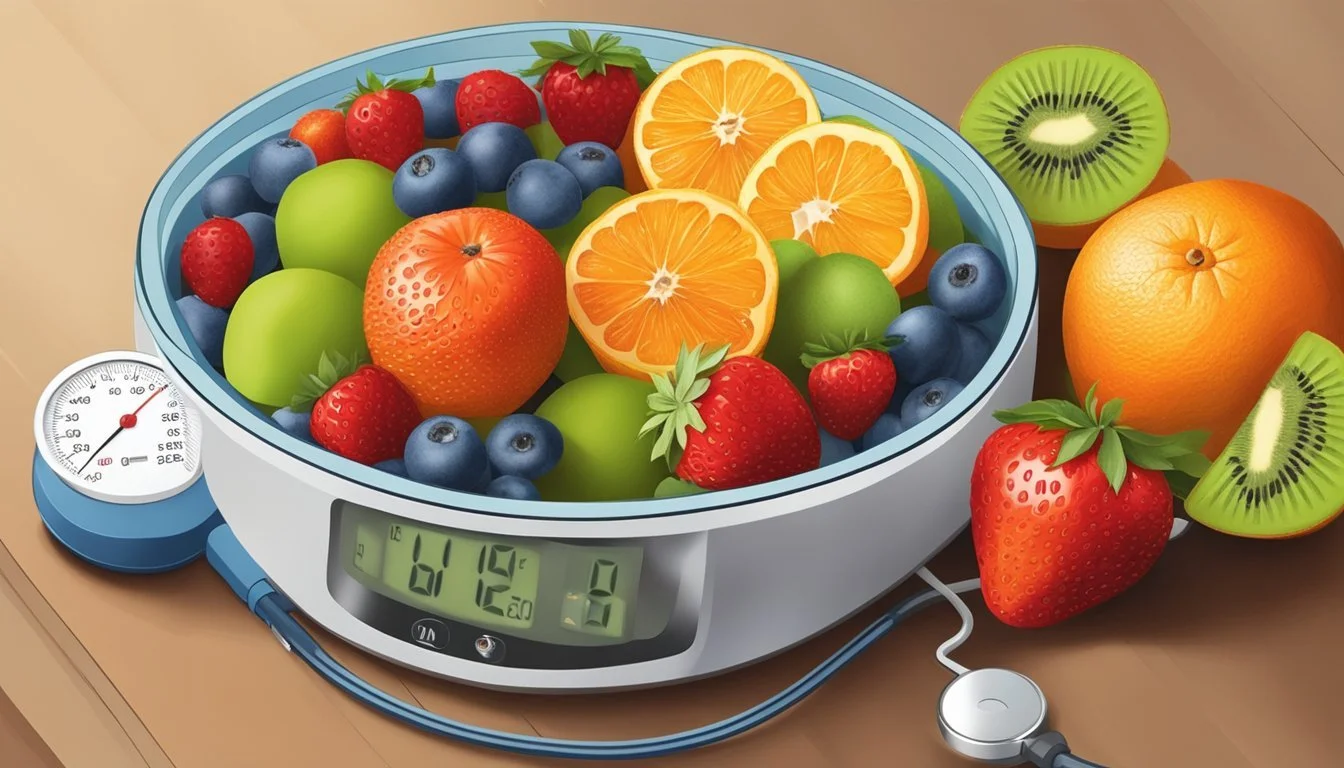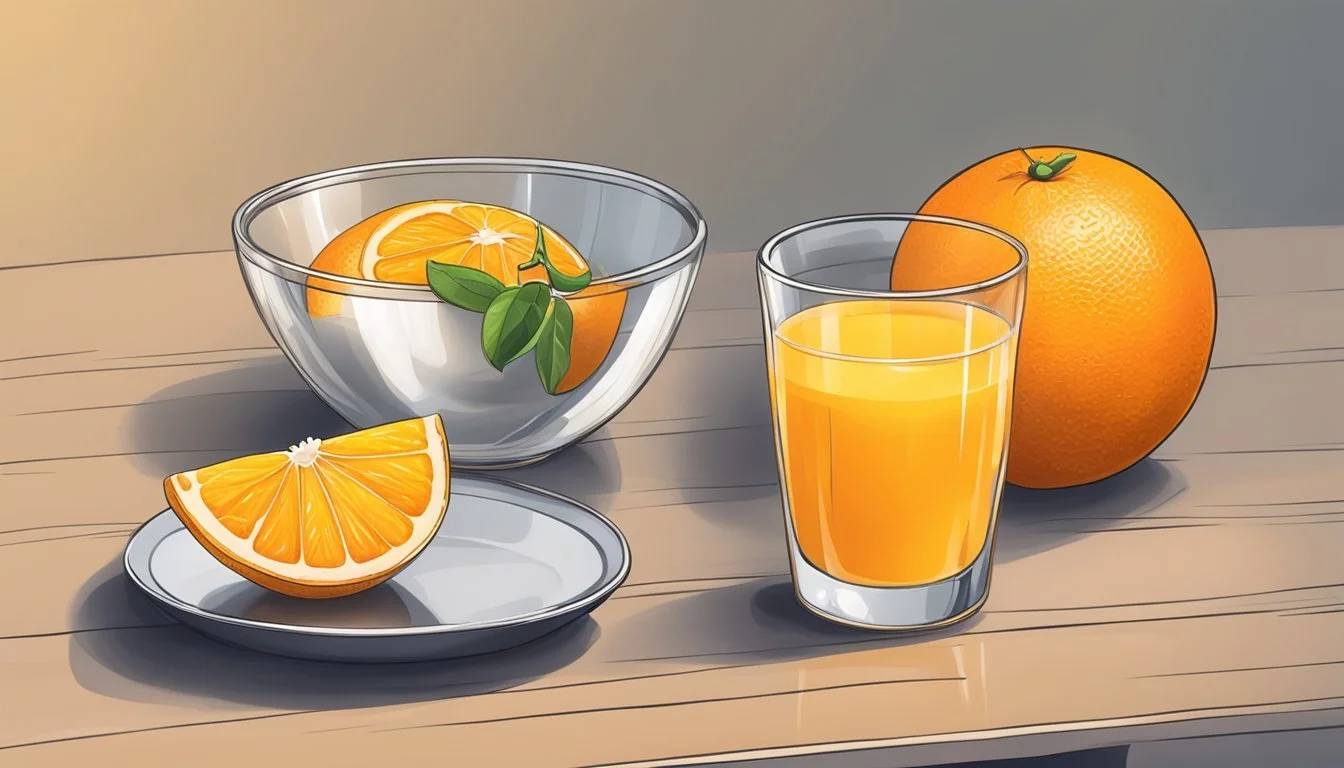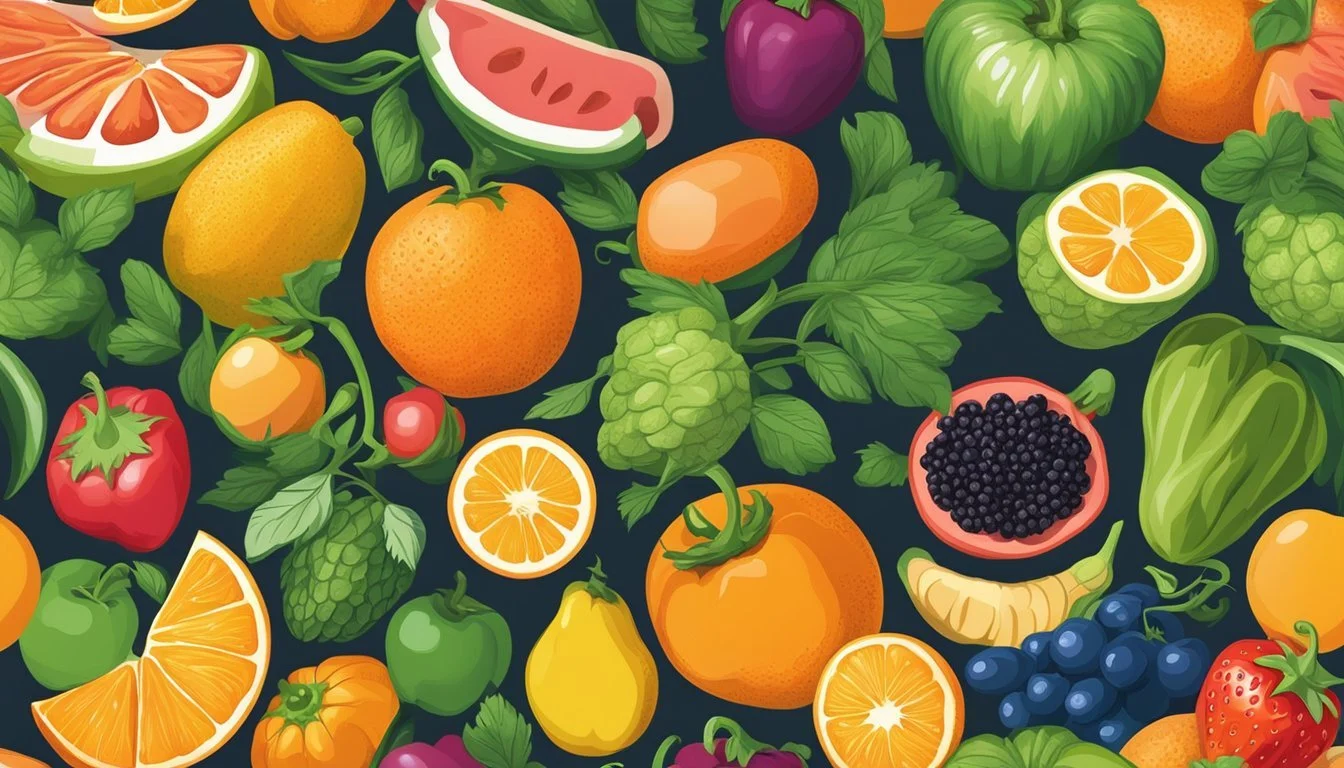What Are Some Good Sources of Vitamin C for Managing Hypertension
Optimal Dietary Choices
Vitamin C, an essential micronutrient found abundantly in various fruits and vegetables, has been recognized for its role in bolstering the immune system. Beyond its immune-boosting capabilities, research suggests that it may also have a beneficial influence on blood pressure levels, making it a point of interest for those managing hypertension. Also known as ascorbic acid, Vitamin C is an antioxidant which helps in protecting the body's cells from damage by free radicals.
Hypertension, commonly referred to as high blood pressure, is a chronic condition that significantly increases the risk of heart disease and stroke. Managing blood pressure is a multifaceted approach that often includes lifestyle changes such as dietary modifications. In the context of diet, incorporating sufficient amounts of Vitamin C might contribute to the maintenance of healthy blood pressure, although it should not be seen as a standalone treatment but as part of a broader health strategy.
Among the various natural sources of Vitamin C, fruits like oranges, kiwis, strawberries, and vegetables such as bell peppers, broccoli, and Brussels sprouts stand out for their high content. These sources provide Vitamin C in a form that is readily absorbed by the body. It is important to consider whole foods rather than supplements to benefit from the synergistic effect of nutrients found naturally in foods, which may work in concert with Vitamin C to support cardiovascular health.
Understanding Hypertension
In approaching hypertension, it's crucial to understand its definition, underlying causes, and its implications on cardiovascular health.
Defining Hypertension
Hypertension, commonly known as high blood pressure, is a condition in which the systolic blood pressure (the top number) reads 130 mm Hg or higher, and the diastolic blood pressure (the bottom number) reads 80 mm Hg or higher. There are two main types:
Primary (essential) hypertension: Develops over time with no identifiable cause.
Secondary hypertension: Caused by an underlying condition.
Causes and Risk Factors
Multiple factors contribute to the development of hypertension, some of which are modifiable, while others are not. Known risk factors include:
Family history of hypertension.
Obesity, as excess weight puts more strain on the heart.
Use of tobacco and alcohol.
A diet high in sodium and low in essential nutrients.
Lack of physical activity.
Elevated stress levels.
Increasing age since the risk of hypertension grows with age.
Modifiable Risk Factors:
Diet
Exercise
Alcohol and Tobacco Use
Stress Management
Non-Modifiable Risk Factors:
Age
Genetics
Hypertension and Cardiovascular Disease
Hypertension is a major risk factor for cardiovascular disease, including:
Heart disease: High blood pressure can lead to coronary artery disease and heart failure.
Stroke: It can cause blood vessels in the brain to clog more easily or to rupture.
Managing hypertension effectively not only lowers the risk of developing cardiovascular diseases but also other complications such as kidney disease.
The Role of Vitamin C in Managing Hypertension
Vitamin C, also known as ascorbic acid, is an essential vitamin that has been studied for its impact on hypertension, a condition characterized by high blood pressure. This section explores how the antioxidant properties of vitamin C influence blood pressure and the considerations surrounding its supplementation for this purpose.
Vitamin C as an Antioxidant
Vitamin C is recognized for its potent antioxidant effects. It helps combat oxidative stress by neutralizing harmful free radicals like superoxide anions. Oxidative stress is linked to endothelial dysfunction, which is a precursor to hypertension. The regular intake of vitamin C potentially aids in preserving vascular endothelial function and maintaining healthy blood flow.
Effects on Blood Pressure
Clinical research offers varying results regarding vitamin C's direct impact on blood pressure. Some studies suggest that higher plasma vitamin C concentrations are associated with lower blood pressure levels. This relationship is thought to stem from vitamin C’s role in supporting endothelial function and subsequently influencing vascular health.
Vitamin C Supplementation
Supplementing with vitamin C has been proposed as a treatment for hypertension. Randomized controlled trials and meta-analyses examining vitamin C supplementation have shown inconsistent outcomes. While some patients with hypertension may experience a decrease in systolic (SBP) and diastolic (DBP) blood pressure with vitamin C supplementation, the extent of its effectiveness can vary widely among individuals. It is important to note that excessive supplementation beyond the recommended levels does not necessarily yield additional blood pressure-lowering effects.
Dietary Sources of Vitamin C
Vitamin C is a potent antioxidant beneficial for managing hypertension and is abundant in a variety of fruits and vegetables. Incorporating these foods into one's diet can contribute to meeting the recommended daily intake of vitamin C and can support blood vessel health and blood pressure regulation.
Fruits Rich in Vitamin C
Fruits are common and tasty sources of vitamin C. Oranges are well-known for their vitamin C content, but there are other fruits with higher levels of this nutrient. Kakadu plums, for instance, contain significantly more vitamin C per serving than oranges. Other fruits with high vitamin C content include:
Kiwifruit: This small, fuzzy fruit provides a substantial amount of vitamin C, far exceeding the content found in bananas, which are relatively low in vitamin C.
Strawberries: Fresh and juicy, these berries are not only rich in flavor but also vitamin C.
Citrus Fruits: Besides oranges, grapefruits, lemons, and limes are all excellent sources of vitamin C and can easily be incorporated into daily meals.
Vegetables High in Vitamin C
Vegetables also contribute to the daily intake of vitamin C, with leafy greens and other family members providing impressive amounts:
Broccoli: This cruciferous vegetable pairs well with whole grains, which, while not a significant source of vitamin C, contribute to a balanced diet.
Spinach: A versatile green, spinach can be enjoyed raw or cooked and is a beneficial addition to the diet for its vitamin C content.
Kale: Another nutrient-rich green, kale can be added to salads, soups, and smoothies.
Tomatoes: Fresh or cooked, tomatoes are a convenient source of vitamin C and can be found in many cuisines around the world.
Potatoes: Often overlooked, white potatoes, particularly when cooked in their skin, provide a reasonable amount of vitamin C.
Incorporating Vitamin C into Your Diet
Incorporating vitamin C into one’s diet can be done through both raw and cooked means, as heat can reduce vitamin C content. Fresh fruits should retain most of their vitamin C content, especially when consumed promptly after purchase. Vegetables can be steamed or microwaved to preserve their vitamin C content compared to boiling. A daily diet that includes a variety of these fruits and vegetables can ensure adequate vitamin C intake, which is essential for overall health, including effective hypertension management.
Lifestyle and Dietary Adjustments for Hypertension
Effective management of hypertension involves a holistic approach encompassing regular exercise, stress management, and specific dietary adjustments. These lifestyle modifications can have a significant impact on maintaining normal blood pressure levels.
Exercise and Physical Activity
Regular physical activity is essential for blood pressure control. The ideal regimen includes 150 minutes of moderate-intensity aerobic exercise per week, or 75 minutes of vigorous-intensity aerobic activity. Activities such as brisk walking, cycling, or swimming aid in maintaining a healthy weight and can reduce the risk of developing hypertension.
Aerobic Exercise: Brisk walking, jogging, cycling
Strength Training: At least 2 days a week
Stress Reduction Techniques
Chronic stress is a contributor to high blood pressure. Stress reduction techniques such as deep breathing, meditation, or yoga are recommended to manage hypertension. They not only lower stress but also improve overall heart health. Individuals should also consider ways to simplify tasks and set realistic goals to reduce daily stress.
Meditation: Mindfulness, Transcendental Meditation
Other Techniques: Deep breathing exercises, yoga
Dietary Patterns for Hypertension
A heart-healthy diet is paramount for managing blood pressure. The Dietary Approaches to Stop Hypertension, or DASH diet, is rich in fruits, vegetables, low-fat dairy products, and includes whole grains, fish, poultry, and nuts. It limits saturated fats, trans fats, and added sugars. Decreasing caffeine intake and moderating alcohol consumption can also help maintain normal blood pressure levels.
Recommended Foods:
Fruits: Oranges, strawberries
Vegetables: Leafy greens, carrots
Grains: Whole grains, like brown rice and whole wheat bread
Proteins: Fish, poultry, legumes
Limit or Avoid:
Salt and high-sodium foods
Sweets and sugary beverages
Red meats
Alcohol and caffeine
Reducing obesity through these diet and exercise patterns is critical, as overweight individuals are at higher risk for hypertension. Smoking cessation is another important aspect, as tobacco use can exacerbate blood pressure issues.
Nutritional Supplements and Medications
In managing hypertension, a strategic combination of nutritional supplements and medications plays a pivotal role. Optimal dosages and awareness of potential interactions are essential for patient safety and efficacy.
Managing Hypertension with Supplements
Nutritional supplements, particularly those rich in minerals and antioxidants, can support blood pressure management. Key supplements include:
Magnesium: Mg helps vasodilation, potentially reducing blood pressure.
Calcium: Adequate calcium levels are linked to regulated blood pressure.
Potassium: Potassium helps balance sodium levels and relax blood vessel walls.
Vitamin D: It may influence blood pressure through its effect on calcium channels.
Vitamin C: Studies suggest intake of Vitamin C can be associated with lower blood pressure.
Vitamin E: While an antioxidant, its effects on blood pressure are less clear than those of other supplements.
Common Antihypertensive Medications
Antihypertensive medications often work by relaxing blood vessels, reducing blood volume, or both. Common types include:
Diuretics: Increase urination to reduce blood volume.
Calcium Channel Blockers: Relax blood vessels by blocking calcium which is necessary for muscle contraction.
ACE Inhibitors: Prevent the formation of a hormone that narrows blood vessels.
A comprehensive drug therapy plan, tailored to the individual, can optimize blood pressure control.
Potential Interactions and Considerations
When combining supplements with medications, patients must consider:
Interactions: Some supplements can influence the effectiveness of blood pressure medications.
Monitoring Levels: Regular monitoring of blood pressure and mineral levels can prevent undesirable interactions or side effects.
Professional Guidance: Consulting healthcare providers is crucial when integrating supplements with medications to ensure safe and effective use.
By focusing on specific supplements and understanding their potential interactions with prescribed medications, individuals can better navigate the management of hypertension.
Scientific Research and Evidence
This section unpacks the connection between Vitamin C supplementation and hypertension management, as illuminated by scientific research and high-quality evidence from various clinical studies.
Clinical Trials on Vitamin C and Hypertension
Recent clinical trials have investigated the role of Vitamin C (ascorbic acid) in managing hypertension. A notable aspect of these trials is their design—a majority being randomized controlled trials (RCTs), the gold standard in clinical research due to their robustness in minimizing selection bias. These studies typically measure the efficacy of Vitamin C by monitoring the blood pressure of participants with a history of hypertension or those with risk factors such as abnormal L-arginine uptake.
Key Findings from Meta-Analyses
Meta-analyses offer a panoramic view, combining results from several studies to strengthen conclusions. A systematic review of RCTs collated data examining the impact of Vitamin C on systolic and diastolic blood pressure. The findings, derived from sources such as the Cochrane Database of Systematic Reviews (Cochrane Database Syst Rev), indicate an association between increased Vitamin C intake and lower blood pressure levels. Moreover, these meta-analyses reconcile results from observational studies and RCTs to adjust for publication bias and heterogeneity.
Challenges in Hypertension Research
One of the complexities in hypertension research is accounting for variables that can skew results, such as allocation concealment, adverse events, selective reporting, and dropouts. The Cochrane Collaboration guidelines emphasize the importance of recognizing these factors to enhance the validity of clinical trial outcomes. Additionally, the measurement of plasma VitC concentration presents biochemical challenges due to its instability and potential to oxidize, requiring stringent control conditions.
Special Considerations for Specific Populations
In managing hypertension, it's crucial to tailor dietary sources of vitamin C to the needs of specific populations. Each group may face unique challenges, and an understanding of these can guide effective nutritional strategies.
Hypertension in the Elderly
The elderly population often deals with an increased risk of hypertension due to age-related changes in blood vessels and the potential for decreased kidney function. A consistent intake of vitamin C-rich foods like citrus fruits, strawberries, bell peppers, and leafy greens is beneficial. Furthermore, because gastrointestinal absorption may decrease with age, it's important to ensure these individuals consume vitamin C throughout the day to optimize uptake.
Citrus fruits: Oranges, grapefruits
Berries: Strawberries, raspberries
Vegetables: Bell peppers, broccoli
Impact of Hypertension on Diabetics
Individuals with diabetes are more susceptible to hypertension, which can exacerbate the risk of cardiovascular diseases and kidney disease. Vitamin C, due to its role in protecting endothelial function and reducing oxidative stress, is particularly important. However, diabetics should be mindful of fruit sugars when selecting vitamin C sources. Low-glycemic fruits and vegetables are recommended.
Low-glycemic fruits: Kiwi, berries
Vegetables: Tomatoes, spinach
Hypertension and Pregnancy
Pregnant women with hypertension need to manage their blood pressure to reduce the risks of complications. Vitamin C intake is vital but needs to be balanced with other nutritional requirements. Since high blood pressure during pregnancy can lead to conditions like preeclampsia, incorporating vitamin C sources that are also rich in other nutrients, such as folic acid and calcium, is beneficial.
Fruits: Cantaloupe, orange
Vegetables: Kale, broccoli
For these populations, a balanced diet including adequate levels of vitamin C can support blood pressure management as part of a broader healthcare strategy.
Conclusion and Moving Forward
Incorporating vitamin C-rich foods into one's diet is a strategy that shows potential in managing hypertension. Examples such as citrus fruits, strawberries, bell peppers, and leafy greens not only contribute to overall health but also support blood pressure regulation. Lifestyle changes including a balanced diet with adequate vitamin C, coupled with regular exercise and stress management, form the bedrock of non-pharmacological hypertension management.
Regular intake of vitamin C through dietary sources or supplementation may offer benefits for heart health. While it's not a standalone solution, research implies a positive correlation between vitamin C intake and a modest reduction in blood pressure. Individuals should consider vitamin C as part of a broader approach to mitigate risk factors associated with heart failure, myocardial infarction, and stroke.
Prospective patients and health-conscious individuals should seek advice from healthcare professionals before beginning any supplementation. Ensuring the dosage is appropriate is crucial, as excessive intake can lead to adverse effects. Vigilance in lifestyle choices combined with informed supplementation can pave the way for improved management of hypertension and may reduce the incidence of cerebrovascular disease and heart attack. Moving forward, continued research and personalized healthcare approaches will remain integral to refining strategies against hypertension.







